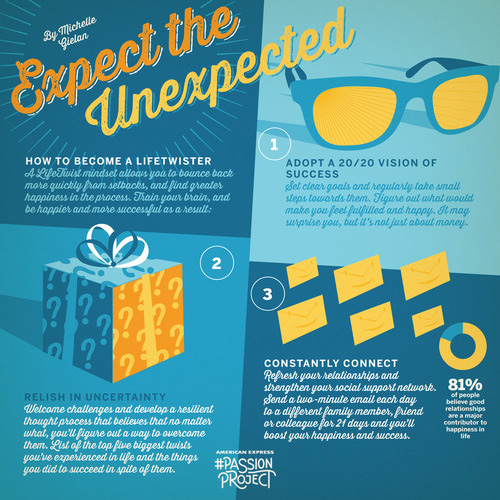
ARE YOU A “LIFETWISTER”?
In 2010 at the height of the recession, I had a life twist of my own. I was a news anchor at CBS News covering heart- wrenching stories of people losing their jobs, homes, and savings, and the emotional toll that took on them. Wanting to do more to help the people I was interviewing, I left CBS News to get a master’s in positive psychology (the science of happiness and human potential) and founded a research institute. I now help individuals and business teams train the brain for success and happiness in the midst of challenges. Our own research shows that those with a LifeTwist mindset are able to bounce back more quickly from setbacks, not to mention find greater happiness in the process.
So how do you create a LifeTwist mindset? Based on our research institute’s findings and inspired by the LifeTwist study, here are the three most effective ways you can train your brain, and be happier and more successful as a result:
ADOPT A 20/20 VISION OF SUCCESS
Research shows that people who have clear goals and regularly take small steps towards them have higher academic achievement, greater career advancement, and are much happier at work.[ii] Take the time to figure out what would make you feel fulfilled and happy, whether it is at work, in parenting, or mastering a new skill. It may surprise you, but it’s not just about money. Think about people who are role models or have success stories to help you hone your vision.
RELISH IN UNCERTAINTY
Uncertainty is inevitable, but the effects don’t have to be overwhelming if you mentally prepare for bumps or unexpected changes. Instead of fearing them, welcome these challenges and develop a resilient thought process that believes that no matter what, you’ll figure out a way to overcome them. Strengthen this belief by considering some of the biggest twists you’ve experienced in life and the concrete things you did to adapt to the situation. Also consider whether there were unexpected benefits. If you lost your job, did it allow you to spend more time with loved ones? Did networking introduce you to new people or new ideas? Connect the dots on how your behavior affected
your current situation.
CONSTANTLY CONNECT
Social connection is the greatest predictor of long-term happiness in life[iii] – so get social. It’s time to refresh your relationships and strengthen your social support network. Our research has found that by simply sending a two-minute email each day to a different family member, friend or colleague, you can substantially deepen your social connection. Do it for 21 days and you not only boost your happiness, but success as well. Lucky for you, 81% of people believe good relationships are a major contributor to happiness in life, so your notes will be well received!
HAS A LIFE TWIST LED YOU TO SOMETHING NEW?
I’m curious to hear about your life twists and how a LifeTwist mindset has helped you navigate the terrain. Tell us about it on Twitter #LifeTwist #PassionProject.
-Michelle Gielan is an expert in positive psychology, the science of happiness and human potential. She is the founder of The Institute for Applied Positive Research. She is a regular contributor to the American Express Tumblr community.
REFERENCES
[i] The LifeTwist Study found that 52% of Americans agreed that “I have a path in mind but I’m open to change and occasionally veering off my path.”
[ii] Findley, M. J., & Cooper, H. M. (1983). Locus of control and academic achievement: A literature review. Journal of Personality and Social Psychology, 44(2), 419–427;
Ng, T. W. H. (2006). Locus of control at work: A meta-analysis. Journal of Organizational Behavior, 27(8), 1057– 1087.
[iii] Vaillant, G. (July 16, 2009). Yes, I stand by my words, “Happiness equals love—full stop.” Positive Psychology News Daily. Retrieved at http://positivepsychologynews.com/news/george-vaillant/200907163163
uggs kopen
uggs outlet
monlcer jassen
moncler jas
moncler outlet
moncler jassen
moncler muts
moncler jas
Article originally published at: http://americanexpress.tumblr.com/post/54017855322/expect-the-unexpected-the-new-psychology-of-success








